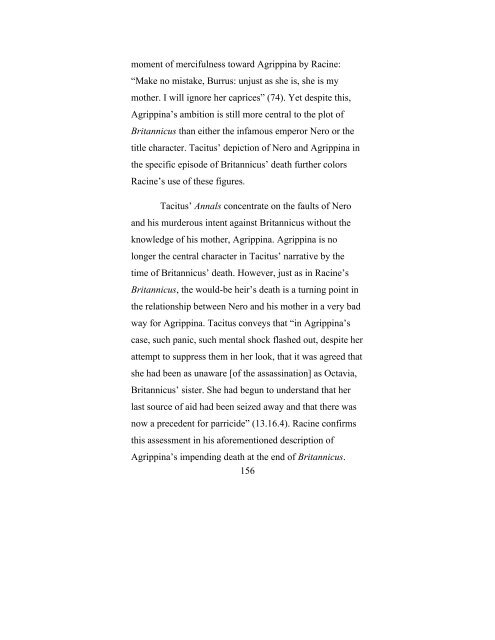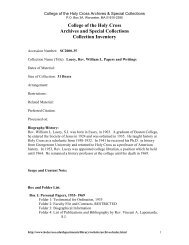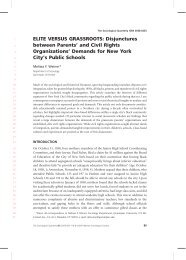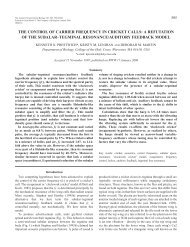Here - Academics - College of the Holy Cross
Here - Academics - College of the Holy Cross
Here - Academics - College of the Holy Cross
You also want an ePaper? Increase the reach of your titles
YUMPU automatically turns print PDFs into web optimized ePapers that Google loves.
moment <strong>of</strong> mercifulness toward Agrippina by Racine:<br />
“Make no mistake, Burrus: unjust as she is, she is my<br />
mo<strong>the</strong>r. I will ignore her caprices” (74). Yet despite this,<br />
Agrippina’s ambition is still more central to <strong>the</strong> plot <strong>of</strong><br />
Britannicus than ei<strong>the</strong>r <strong>the</strong> infamous emperor Nero or <strong>the</strong><br />
title character. Tacitus’ depiction <strong>of</strong> Nero and Agrippina in<br />
<strong>the</strong> specific episode <strong>of</strong> Britannicus’ death fur<strong>the</strong>r colors<br />
Racine’s use <strong>of</strong> <strong>the</strong>se figures.<br />
Tacitus’ Annals concentrate on <strong>the</strong> faults <strong>of</strong> Nero<br />
and his murderous intent against Britannicus without <strong>the</strong><br />
knowledge <strong>of</strong> his mo<strong>the</strong>r, Agrippina. Agrippina is no<br />
longer <strong>the</strong> central character in Tacitus’ narrative by <strong>the</strong><br />
time <strong>of</strong> Britannicus’ death. However, just as in Racine’s<br />
Britannicus, <strong>the</strong> would-be heir’s death is a turning point in<br />
<strong>the</strong> relationship between Nero and his mo<strong>the</strong>r in a very bad<br />
way for Agrippina. Tacitus conveys that “in Agrippina’s<br />
case, such panic, such mental shock flashed out, despite her<br />
attempt to suppress <strong>the</strong>m in her look, that it was agreed that<br />
she had been as unaware [<strong>of</strong> <strong>the</strong> assassination] as Octavia,<br />
Britannicus’ sister. She had begun to understand that her<br />
last source <strong>of</strong> aid had been seized away and that <strong>the</strong>re was<br />
now a precedent for parricide” (13.16.4). Racine confirms<br />
this assessment in his aforementioned description <strong>of</strong><br />
Agrippina’s impending death at <strong>the</strong> end <strong>of</strong> Britannicus.<br />
156
















